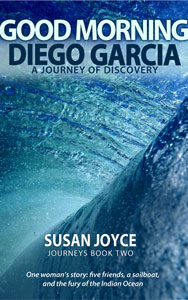
Trincomalee, Sri Lanka—1975
At 3:32 PM local time, on 19 July, 1975, Alon cut the rope tied to the
anchor and Zozo danced about in the water. I looked at the ship’s
clock and noted it in my journal, and placed the journal back in its
protective pouch.
We were no longer tied to the shore or the seabed. We were afloat.
I grabbed a life jacket, and quickly put it on, making certain it was
tied tight. Knowing psychology is an important tool for survivors, I
reminded myself of the importance of a positive image in dangerous
situations and imagined myself floating in the life jacket until rescued.
We were on deck as we set sail. Alon, Charles, and Mia scurried about,
preparing lines and sails while Dylan piloted the yacht out of the harbor.
I sat in what appeared to be the safest spot on deck, the center
seat, and clung to the seat and the railing. I gripped the railing tighter
when the ship pitched side to side.
Pots and pans rattled in the galley below, I realized this would be more
of an adventure than I had ever imagined. I saw a pan fly loose in the
galley and heard a loud thunk when it landed. Hope Toto didn’t get hit!
The crew on another boat waved goodbye. I waved back. A sudden
shift threw me forward. Forget waving. Hang on for dear life!
The harbor bobbed upward and downward, and the boat rocked back
and forth as we entered the open sea. The incessant waves made me
off-balance and dizzy. Queasy. No time to vomit now. No place to
vomit now.
Water slapped my face and drenched the deck. I watched Charles stumble
across it and stagger down the stairs. He must be feeling sick as well.
In an instant, the boat turned sideways, quickly straightened out, and
shot full speed ahead.
Dylan yelled, “storm overhead.”
I almost lost my lunch, but not my hold on the rail.
Dylan’s adjustment of the sails forced me to sit upright, again tightly
clutching the rails; determined not to be tossed overboard before we
even got out into the open ocean.
“It’s okay,” Mia said in a loud voice. “Dylan turned the wheel to change
course, and get us away from the storm.”
As we lurched ahead, south-west in the direction of the Seychelles. I
questioned why I had ever agreed to this crazy adventure. I wanted to
scream, Stop, let me off, but instead I moaned, “I feel sick.”
“It’s normal,” Mia said. “You’ll get used to it. Just remember to keep
your eyes on the horizon.”
“I’ll try,” I said, trying hard not to vomit or cry.
When I looked back, I saw black clouds covering the port of Trincomalee.
Large sheets of rain moved across the dark sky. The ships in
port became small dots on the horizon as Zozo moved forward into a
blue sky. Terra firma was going away as we sailed into the unknown.
Dylan unfurled and hoisted the sails.
Much to my surprise, the yacht became more stable with wind.
A few minutes later, I heard Dylan announce, “six knots.” He was
smiling. The wind whisked us ahead at a smooth speed.
Remembering Mia’s words, my eyes searched for land. I turned round
and round. Trincomalee had disappeared. No land in sight. Only
water as far as I could see. A water horizon surrounded me. A strange
feeling, one I had never experienced before.
“How far away is it?” I queried Dylan.
“To where?” he asked.
“The Seychelles,” I answered.
“Only 3198.5 kilometers,” he said smiling. “As the crow flies.”
“From Trincomalee to the Seychelles?” I asked again.
He nodded. “1725.9 nautical miles.”
“Almost 2,000 miles!” Oh to be a crow.
“Correct,” he said. “With sailing and tacking, it becomes more.”
“How much more?”
“If we change course and head into the wind, it will take longer.”
“How long will it take?” I asked.
“Depends on the weather,” Dylan answered.
I couldn’t even imagine traveling 2,000 miles across the ocean and not
seeing land. “Is there any land between here and there?” I asked.
He shook his head no. “Open ocean.”
The wind blew stronger. Still feeling nauseous, I decided to go inside
to be near a toilet. I took my time zigzagging across the deck, and
moved lower into the galley.
I picked up the fallen pots and pans and tossed them into the kitchen
sink. I slumped on a chair and waited for the motion sickness to go
away. I looked around for a sign of Toto, but my eyes failed to focus.
How long will this last? It seemed too hot and stuffy inside, so I got up
and moved toward the steps to the deck, gripping the railing for balance.
Got to have fresh air, I thought. Air will surely help. Straddling
the stairs, I clung tight to the railing, and waited for my eyes to focus.
A hand reached down. It was Mia’s, helping me climb up.
“Thank you,” I said, taking her hand and stepping onto the deck.
The waves had subsided, and the boat was gently bobbing along the
sea. Charles was also back up, sitting on deck. I asked him how he
was feeling.
“Sick,” he answered looking ashen. “I’m going back to bed.”
“Mia says it’s best to keep looking at the horizon.”
He shook his head no, and headed to the stairs, weaving about like a
drunk sailor.
“Hang on to the rails,” Dylan yelled. “It’s fairly calm now. If the seas get
rough, we’ll secure ourselves with life lines.”
Good, I thought. So we don’t get thrown overboard.
I remembered the ginger root remedy. I got up, and in slow motion
crossed the deck and snaked my way down to the galley.
Mia was in the galley making coffee for Dylan. She had put a kettle of
water on for tea. I peeled the ginger root and placed slices of it in cups
for me and Charles. When the kettle whistled, I poured boiling water
in the cups and let the ginger steep.
“Are you okay to carry it?” Mia asked.
“I’ll drink mine first and take a cup to Charles later,” I answered. Sipping
slowly, I starred at the coffee pot and let the warm, spicy bite of
ginger sink in. No wonder the coffeepot stayed in one place. It was
secured with nuts and bolts. A good thing. The way Dylan drank coffee
around the clock; rough seas or smooth sailing.
Mia took a fresh cup of coffee up to Dylan.
When she returned, I asked if she had seen Toto.
“Not today,” she answered.
“Do you ever get seasick?” I asked.
“Not anymore. You’ll get used to the motion,” she answered.
“Sure hope so,” I said.
I took the ginger tea to Charles and told him about the 2,000 mile
distance from Trincomalee to the Seychelles.
“I know,” he said. “I saw it on the map.”
“It’s a long way to go without charts,” I said.
He nodded his head. “Dylan assures me he can navigate by the stars.”
“Like Christopher Columbus?”
“We’ll see,” Charles said.
“What if the sun doesn’t shine?” I asked.
Charles shrugged his shoulders. “He’ll measure sights between the
horizon and a celestial object.”
“Like the moon or other planets?”
“Yes.”
“How does he do it?”
“With an instrument called a sextant, It determines the angle between
the astronomical object and the horizon.”
“Hard to imagine how it’s even possible,” I added, feeling worried.
“Dylan will take a sighting from time to time to know where we are,
and write it in a log book.”
“I’m heading up for fresh air and more ginger tea. Would you like
another cup?”
“No thanks!” Charles waved me away.
We had agreed to work four hour shifts. Feeling dizzy and queasy, I
couldn’t even imagine being of help to anyone today. Hopefully Mia
is correct in thinking it will pass. I didn’t like having wobbly sea legs.
I made more ginger tea, then worked my way back up the stairs to a
center deck seat.
I heard Dylan tell Alon we had a good wind and were making headway.
“How many miles do we go in an hour?” I asked.
“About five,” Dylan answered.
I figured it out in my head. “So, we’ll travel 120 miles in a day?” I asked.
“More or less,” Dylan said. “Depends on the weather.”
That’s like crawling, I thought. How many days would it take us to
reach land? The thought made me dizzier.
“Make yourself comfortable and enjoy the trip,” Alon said, smiling.
I sighed. Wishing it so.
The weather was nice the first two days, but feeling so disoriented
wasn’t fun. No thinking clearly, hanging on for dear life to anything I
could find. I wasn’t able to help do my shifts and neither was Charles.
My legs continued to wobble and I knew I was going to vomit clear
across the deck. I took a deep breath and talked to myself. No need to
vomit. Nothing in your stomach to vomit. Keep drinking ginger tea.
This feeling will pass.
And it did. By the morning of the third day, I could move about without
hanging on to anything. The seas were calm and the cool of the
breeze was soothing. I even enjoyed a stew Mia had made for our main
meal early afternoon. Charles was also feeling better, but didn’t want
to risk eating anything yet.
I offered to help Dylan, and sat on deck during his watch. He drank
cup after cup of coffee and never seemed to need a break or sleep. My
job was to be the lookout and make certain we avoided collision with
another ship or any other obstacle. All I could see was mile after mile
of water and waves.
As I sat watching the sea in the evening under the moonlight, I realized
Dylan really did look like Sinbad; snagged-tooth smile and all. Bet he’s
had some amazing adventures in his life. I wanted to ask. But Dylan,
like Charles, didn’t share much information about his past. He seemed
to have secrets. He did hum and whistle though, which I enjoyed.








